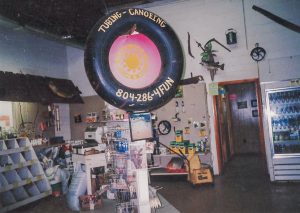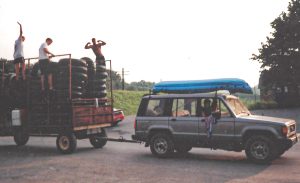These days, our staff, equipment and shuttles are available to guests from April to October. In addition to riverside tent camping, there are a few local cabins, cottages and AirBnB’s available as additional lodging opportunities. We have grown our fleet and merry band of misfits into a community hub, offering canoe, kayak, raft rentals, and lazy river tubing. We have the unique opportunity for our guests to experience roughing it on the river but all within a short walk of our hot showers and the trusty river store for those last minute grabs before your shuttle. We are also within town limits where our guests have access to restaurants, shops and our local brewery.
Our river family is ready to welcome you back or for your group’s first time. If you’re anything like us, you’ll get hooked after your first excursion. Whether it’s the small mouth fishing, the nature watching or just the sunset over the water, this river finds a way into your soul.
Town of Scottsville History:
Located on the Horseshoe Bend of the scenic James River in the foothills of the beautiful Blue Ridge Mountains. In April, 1976, the Virginia Historic Landmarks Commission placed Scottsville Historic District on the Virginia Landmarks Register and nominated it to the National Register of Historic Places. The commission state that “Scottsville Historic District richly deserves this recognition.”
This area lies at the beautiful Horseshoe Bend, Between an old Indian ford and the mouth of Totier Creek. It was here, in February, 1745, that a meeting was held at the Edward Scott home to organize the new county of Albemarle, formed in September, 1744, by an Act of the Virginia General Assembly. On a high hill overlooking the river, the first Albemarle County Courthouse was built. The courthouse is no longer standing, and its exact site on the hill has yet to be determined, but the old Edward Scott home has been restored and is now a private residence.
The courthouse was the center of local government until the Albemarle County seat was moved to the new town of Charlottesville, in 1762. Despite this move, Scottsville, first called Scott’s Landing, later Scott’s Ferry, and in 1818, incorporated as the town of Scottsville, has had an interesting and historically significant survival.
Early settlers along the Atlantic coast found three main river carved passages through the Appalachian barrier into the interior of the continent. One of these three, the southernmost, “led up the James, down the New and Kanawha Rivers and so on into the Ohio, the spot on the James River that lay at the hub of the wheel of exploration, commercial development, and cultural expansion, was a pleasant patch of land at Horseshoe Bend. Here at the northwest limits of the river’s navigability, grew Scottsville, the principal port for river and canal traffic above Richmond and the destination of wagon and pack trains from the upper Shenandoah Valley across Rockfish Gap into Albemarle County.
“So strategic was Scottsville’s position that Tarleton threatened it, Lafayette defended it, and in another was Sheridan and Custer occupied it.”
The James River-Kanawha Canal project was in the 1830’s and ‘40’s, a time of rapid growth for Scottsville. Hundreds of bateaux carrying freight, and packets carrying passengers, came in and left from the Scottsville port during the town’s 19th century heyday. “Scottsville received, exchanged, nourished, refreshed, and encouraged the traffic of the canal, which passed through it.”
Now the Kanawha Canal is the site of Scottsville’s A. Ramon Thacker Levy, protecting the precious town from the mighty flood waters of the James River.
A quiet charming, historic river town, people come from near and far to enjoy Scottsville’s relaxed atmosphere, federal architecture, local history museum, Confederate cemetery, scenic countryside, restaurants, country inns, B&B’s, antiquing, Virginia wine Tastings, FISHING, CANOEING, INNER TUBING, RAFTING, KAYAKING & CAMPING, All just minutes away. Come Visit Scottsville and enjoy the down home atmosphere.
For other interesting Scottsville historical information: www.scottsville.org



